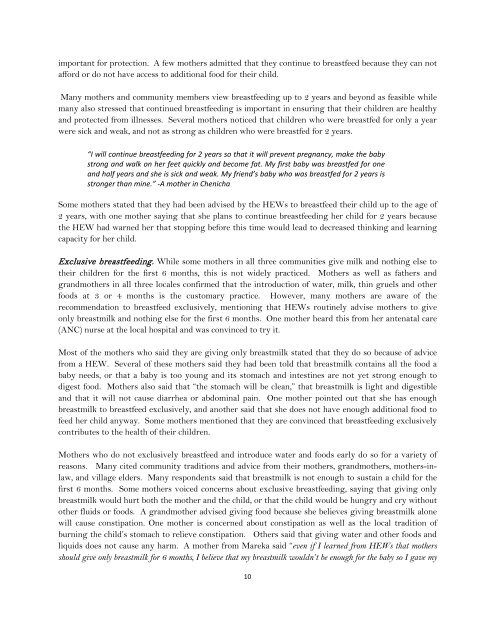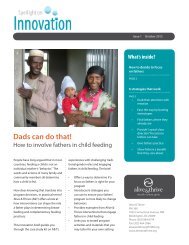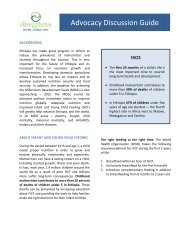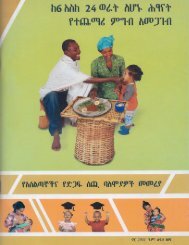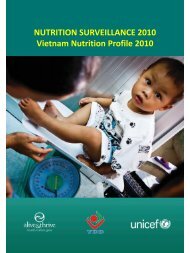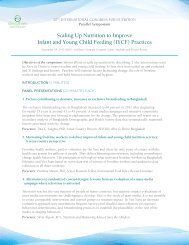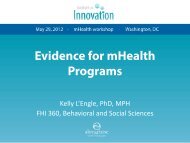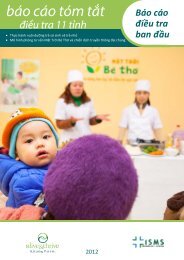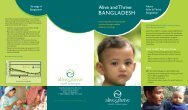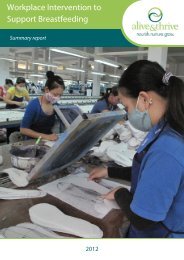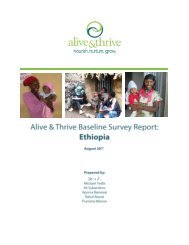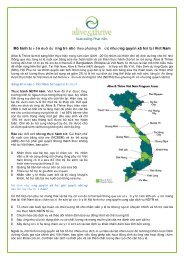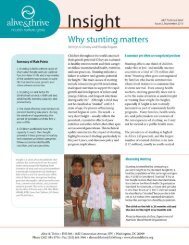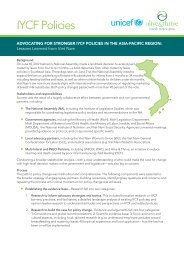IYCF Practices, Beliefs, and Influences in SNNP ... - Alive & Thrive
IYCF Practices, Beliefs, and Influences in SNNP ... - Alive & Thrive
IYCF Practices, Beliefs, and Influences in SNNP ... - Alive & Thrive
Create successful ePaper yourself
Turn your PDF publications into a flip-book with our unique Google optimized e-Paper software.
important for protection. A few mothers admitted that they cont<strong>in</strong>ue to breastfeed because they can notafford or do not have access to additional food for their child.Many mothers <strong>and</strong> community members view breastfeed<strong>in</strong>g up to 2 years <strong>and</strong> beyond as feasible whilemany also stressed that cont<strong>in</strong>ued breastfeed<strong>in</strong>g is important <strong>in</strong> ensur<strong>in</strong>g that their children are healthy<strong>and</strong> protected from illnesses. Several mothers noticed that children who were breastfed for only a yearwere sick <strong>and</strong> weak, <strong>and</strong> not as strong as children who were breastfed for 2 years.“I will cont<strong>in</strong>ue breastfeed<strong>in</strong>g for 2 years so that it will prevent pregnancy, make the babystrong <strong>and</strong> walk on her feet quickly <strong>and</strong> become fat. My first baby was breastfed for one<strong>and</strong> half years <strong>and</strong> she is sick <strong>and</strong> weak. My friend’s baby who was breastfed for 2 years isstronger than m<strong>in</strong>e.” -A mother <strong>in</strong> ChenichaSome mothers stated that they had been advised by the HEWs to breastfeed their child up to the age of2 years, with one mother say<strong>in</strong>g that she plans to cont<strong>in</strong>ue breastfeed<strong>in</strong>g her child for 2 years becausethe HEW had warned her that stopp<strong>in</strong>g before this time would lead to decreased th<strong>in</strong>k<strong>in</strong>g <strong>and</strong> learn<strong>in</strong>gcapacity for her child.Exclusive breastfeed<strong>in</strong>g. While some mothers <strong>in</strong> all three communities give milk <strong>and</strong> noth<strong>in</strong>g else totheir children for the first 6 months, this is not widely practiced. Mothers as well as fathers <strong>and</strong>gr<strong>and</strong>mothers <strong>in</strong> all three locales confirmed that the <strong>in</strong>troduction of water, milk, th<strong>in</strong> gruels <strong>and</strong> otherfoods at 3 or 4 months is the customary practice. However, many mothers are aware of therecommendation to breastfeed exclusively, mention<strong>in</strong>g that HEWs rout<strong>in</strong>ely advise mothers to giveonly breastmilk <strong>and</strong> noth<strong>in</strong>g else for the first 6 months. One mother heard this from her antenatal care(ANC) nurse at the local hospital <strong>and</strong> was conv<strong>in</strong>ced to try it.Most of the mothers who said they are giv<strong>in</strong>g only breastmilk stated that they do so because of advicefrom a HEW. Several of these mothers said they had been told that breastmilk conta<strong>in</strong>s all the food ababy needs, or that a baby is too young <strong>and</strong> its stomach <strong>and</strong> <strong>in</strong>test<strong>in</strong>es are not yet strong enough todigest food. Mothers also said that “the stomach will be clean,” that breastmilk is light <strong>and</strong> digestible<strong>and</strong> that it will not cause diarrhea or abdom<strong>in</strong>al pa<strong>in</strong>. One mother po<strong>in</strong>ted out that she has enoughbreastmilk to breastfeed exclusively, <strong>and</strong> another said that she does not have enough additional food tofeed her child anyway. Some mothers mentioned that they are conv<strong>in</strong>ced that breastfeed<strong>in</strong>g exclusivelycontributes to the health of their children.Mothers who do not exclusively breastfeed <strong>and</strong> <strong>in</strong>troduce water <strong>and</strong> foods early do so for a variety ofreasons. Many cited community traditions <strong>and</strong> advice from their mothers, gr<strong>and</strong>mothers, mothers-<strong>in</strong>law,<strong>and</strong> village elders. Many respondents said that breastmilk is not enough to susta<strong>in</strong> a child for thefirst 6 months. Some mothers voiced concerns about exclusive breastfeed<strong>in</strong>g, say<strong>in</strong>g that giv<strong>in</strong>g onlybreastmilk would hurt both the mother <strong>and</strong> the child, or that the child would be hungry <strong>and</strong> cry withoutother fluids or foods. A gr<strong>and</strong>mother advised giv<strong>in</strong>g food because she believes giv<strong>in</strong>g breastmilk alonewill cause constipation. One mother is concerned about constipation as well as the local tradition ofburn<strong>in</strong>g the child’s stomach to relieve constipation. Others said that giv<strong>in</strong>g water <strong>and</strong> other foods <strong>and</strong>liquids does not cause any harm. A mother from Mareka said “even if I learned from HEWs that mothersshould give only breastmilk for 6 months, I believe that my breastmilk wouldn’t be enough for the baby so I gave my10


